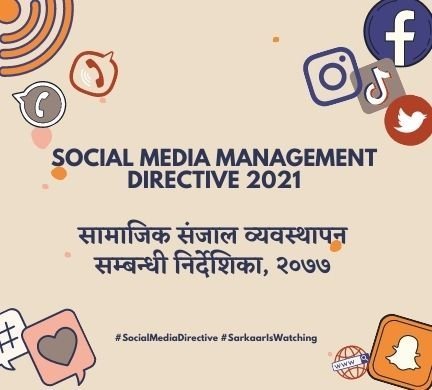
Recently, the Information and Communication Department came up with “Social Media Management Directives” to manage and limit social media on the grounds of morality. This social media directive plays a huge role in shaping how our online space and behavior works and it affects all of us on an individual level. While wearing the mask of “regulating social media companies”, the government actually wants to regulate your content on social media.
By telling social media companies to register through the directive, government is trying to regulate and monitor our content, and the directive orders the companies to comply to governments’ demand to remove the content if it doesn’t fit their ideas of morality and decency. This is censorship. Moreover, if the companies don’t register, they can be banned in the country. In the future, this directive can be taken as a just reason for people to lose social media access when they need the most. These types of compliance to governments’ demand are authoritative and restrictive. The directive limits the ways we can hold authorities and powerful institutions accountable. The directive discourages criticisms and comments, which means that powerful bodies can escape public scrutiny. In addition, those who criticize powerful institutions can be criminalized.
The most used terms in the directive are “social morality”, “appropriate behavior”, “character” which are vague and ambiguous and are used for moral policing us. This specially effects marginalized groups like women and queer folks, whose sexuality and behaviors are more controlled and regulated. Our society looks at anything related to sexuality as something ‘immoral’ or ‘indecent’. The use of such language in the directive could be interpreted and used to curtail and criminalize activities related to our sexuality even when there is pleasure and consent.
In the directive, anonymity is only understood as a criminalized behavior. However, anonymity allows people to express themselves and their opinions without threat (example: queer people, artists, journalists) and criminalization of the anonymity puts these groups into risks of digital as well as physical risk.
The directive asks for evidences before publicly calling people out. Social movements like #MeToo are affected which means that in the future, victims of sexual abuse have more restrictions and hurdles to share their story. Moreover, having evidences doesn’t mean that people can humiliate or harass someone. For example, having a person’s nudes (which can be interpreted an evidence) doesn’t mean one can harass or threaten the person.
Directive discourages critical discourse and engagement (even likes, shares, comments, reposts!). Through surveillance of our online space, the government want to silence the voices against them by criminalizing act of resistance against authorities. In a broader sense, these types of surveillance and controls are shaping human behavior and attitude to make us, citizens docile and law abiding by discouragement of critical discourse and agency over our opinions.
सामाजिक संजाल व्यवश्थापन सम्बन्धि निर्देशिका, २०७७ र एसका समस्याहरु
हालसालै नेपाल सरकारले सूचना प्रविधि विभागमार्फत नैतिकता र सदाचारको आधारमा सामाजिक संजाललाई व्यवस्थित र नियन्त्रित गर्न सामाजिक संजाल व्यवश्थापन सम्बन्धि निर्देशिका, २०७७(खाका) प्रस्ताब गरेको छ । तर यस निर्देशिकामा नागरिकहरुलाई असर पर्ने खालका के-कस्ता समस्याजनक व्यवश्थाहरु छन् त? सामाजिक संजाल व्यवश्थापन सम्बन्धि निर्देशिकाले हाम्रो अनलाईन थलो र ब्यवहारहरुलाई निर्धारण र निर्माण गर्न ठुलो भूमिका खेल्छ, जसले हामीलाई व्यक्तिगत रुपमा पनि असर पर्छ । अतः “सामाजिक संजाल संचालक/सस्था” लाई नियमन गर्ने नाममा सरकारले जनताका अनलाईन व्यवहार तथा सामग्रिहरुलई नियन्त्रण गर्दाछ ।
सोसल मिडिया कम्पनीहरुलाई अनिवार्य दर्ता गर्न भन्नु भनेको हाम्रो अभिव्यक्तिको अनुगमन र नियमन गर्नु हो । जसमा सरकारले आफुलाई अमर्यादित या सदाचार बिरुद्द लाग्ने अभिव्यक्तिलाई सोसल मिडियालाई भनेर हटाउन सक्ने खालको सेन्सरसिपको सम्भावना छ । यस निर्देशिकाले सरकार, आधिकारिक निकाए तथा सस्थाहरुलाई जनता र सवालप्रति उत्तरदायी बनाउन पाउने कार्यलाई साघुरो गरिदिन्छ। जसले जनताको आलोचना र फरक प्रतिक्रियाहरुलाई निरुत्साहित गर्दछ र शक्तिमा रहेका व्यक्ति तथा निकायलाई शार्वजनिक उत्तरदायीताबाट भाग्न मौका दिन्छ । र जसले शक्तिसम्पन्न निकायलाई आलोचना गर्दछन उनीहरुलाई आपराधिकरण गरिन्छ ।
हाम्रो समाजले यौनिकतासम्बन्धि हरेक कुरालाई “अनैतिक” वा “अशभ्य” रुपमा व्याख्या गर्दछ । निर्देशिकाका यस्ता भाषाहरुको प्रयोगले आनन्द वा सहमतिसहितको यौनिकता क्रियाकलापहरुलाई गलत व्याख्या गरि रोक लगाउन प्रयोग हुनुका साथै आपरधिकारण गर्दछ। निर्देखिकामा प्रयोग भएका प्राय शब्दहरु जस्तै “सामाजिक सदाचार”, “मार्यादित व्यवहार”, “चरित्र” आदि शब्द आफैमा बृहत तथा विविध अर्थ रख्छन र यी शब्दहरु हामीलाई मोरल पुलिशिंगका लागि प्रयोग हुन्छ। यसले मुलतः सिमंतकृत समुदाय जस्तै महिला तथा क्वेर व्यक्तिहरुलाई असर पार्छ, जसका यौनिकता र क्यावहारहरु नियन्त्रण र संचालित हुन्छन ।
कानुनले प्राय अनभिज्ञतालाई (Anonymity) आपराधिक व्यवहार/ क्रियाकलापको रुपमा बुझ्छ । जबकी अनभिज्ञताले मानिसहरुलाई आफु र आफ्ना विचारहरुलाई बिना कुनै डर व्यक्त गर्दछन ( जस्तै; क्वेर व्यक्ति, कलाकार, पत्रकार). तर यसलाई आपराधिकारण गरिदा यी समुदायलाइ अझ भौतिक तथा डिजिटल/ प्राविधिक जोखिममा पुराउछ।
निर्देशिकाले कसैमाथि बिना प्रमाण अभियोग लाउन पाउदैन भनेको छ । यसले मि टु जस्तो सामाजिक अभियानलाई प्रभाब पर्नेछ । फेरी प्रमाण भएकै आधारमा कसैलाई दुर्ब्यबहार गर्न पाउनु पर्छ भन्ने होइन । उधाहरणको लागि कसैको नाङ्गो तस्बिर हाम्रो सामाजिक मान्यता अनुसार चरित्रको प्रमाण हुन सक्छ त्यसको आधारमा व्यक्तिलाई धम्कि वा दुर्ब्यबहार गर्न मिल्दैन ।
निर्देशिकाले फरक मत र सहभागिता (लाइक, सेयर, कमेन्ट, रिपोस्ट समेत ) लाई निरुत्साहित गरेको छ । हाम्रो अनलाईन उपस्थितिको अनुगमन गरेर सरकार प्रतिको हाम्रो समलोचंत्मक आवाजलाई समेत अपराधीकरण गरि निस्तेज पार्न सक्ने देखिन्छ । समग्रमा भन्दा, यस्तो खालको निगरानी र नियन्त्रणले मान्छेको आदत र स्वभावलाई सरकार अनुकुल हुनका लागि परिमार्जन गर्न र हाम्रो एजेन्सी/स्वायत्तता प्रयोग गरि सरकारप्रतिको समालोचनात्मक विचारलाई निरुत्साहित गर्छ ।
